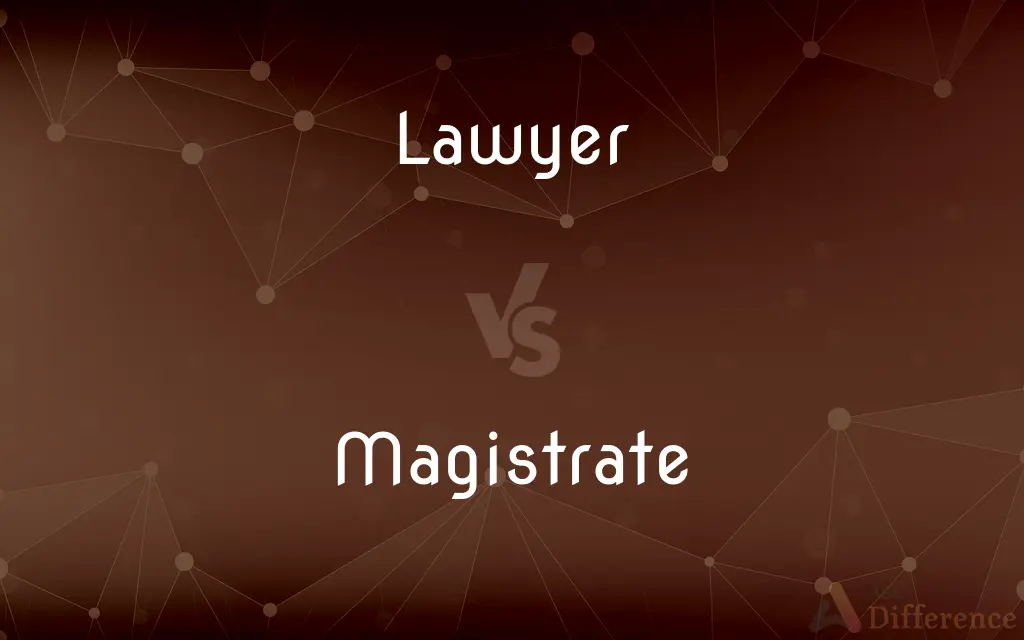Lawyer vs. Magistrate — What's the Difference?

Difference Between Lawyer and Magistrate
ADVERTISEMENT
Compare with Definitions
Lawyer
A professional person with a graduate law degree that qualifies for legal work (such as Juris Doctor)
Magistrate
The term magistrate is used in a variety of systems of governments and laws to refer to a civilian officer who administers the law. In ancient Rome, a magistratus was one of the highest ranking government officers, and possessed both judicial and executive powers.
Lawyer
A lawyer or attorney is a person who practices law, as an advocate, attorney at law, barrister, barrister-at-law, bar-at-law, canonist, canon lawyer, civil law notary, counsel, counselor, solicitor, legal executive, or public servant preparing, interpreting and applying the law, but not as a paralegal or charter executive secretary. Working as a lawyer involves the practical application of abstract legal theories and knowledge to solve specific individualized problems, or to advance the interests of those who hire lawyers to perform legal services.
Magistrate
A judge or justice of a local or inferior court; a justice of the peace.
Lawyer
One whose profession is to give legal advice and assistance to clients and represent them in court or in other legal matters.
ADVERTISEMENT
Magistrate
A judge in a court having jurisdiction over the trial of misdemeanors and preliminary hearings involving felonies.
Lawyer
A professional person qualified (as by a law degree or bar exam) and authorized to practice law as an attorney-at-law, solicitor, advocate, barrister or equivalent, i.e. represent parties in lawsuits or trials and give legal advice.
A lawyer's time and advice are his stock in trade. - aphorism often credited to Abraham Lincoln, but without attestation
Magistrate
A public official with the chief administrative power in a district or region.
Lawyer
(by extension) A legal layman who argues points of law.
Magistrate
(legal) A judicial officer with limited authority to administer and enforce the law. A magistrate's court may have jurisdiction in civil or criminal cases, or both.
Lawyer
The burbot.
Magistrate
(historical) A high official of the state or a municipality in ancient Greece or Rome.
Lawyer
The stem of a bramble.
Magistrate
A comparable official in medieval or modern institutions.
Lawyer
Any of various plants. en
Magistrate
(Quebec) A master's degree.
Lawyer
To practice law.
Magistrate
A person clothed with power as a public civil officer; a public civil officer invested with the executive government, or some branch of it.
Of magistrates some also are supreme, in whom the sovereign power of the state resides; others are subordinate.
Lawyer
(intransitive) To perform, or attempt to perform, the work of a lawyer.
Magistrate
A public official authorized to decide questions bought before a court of justice
Lawyer
(intransitive) To make legalistic arguments.
Lawyer
To barrage (a person) with questions in order to get them to admit something.
You've been lawyered!
Lawyer
One versed in the laws, or a practitioner of law; one whose profession is to conduct lawsuits for clients, or to advise as to prosecution or defence of lawsuits, or as to legal rights and obligations in other matters. It is a general term, comprehending attorneys, counselors, solicitors, barristers, sergeants, and advocates.
Lawyer
The black-necked stilt. See Stilt.
Lawyer
A professional person authorized to practice law; conducts lawsuits or gives legal advice
Share Your Discovery

Previous Comparison
Face vs. Phase
Next Comparison
Build vs. Raise














































